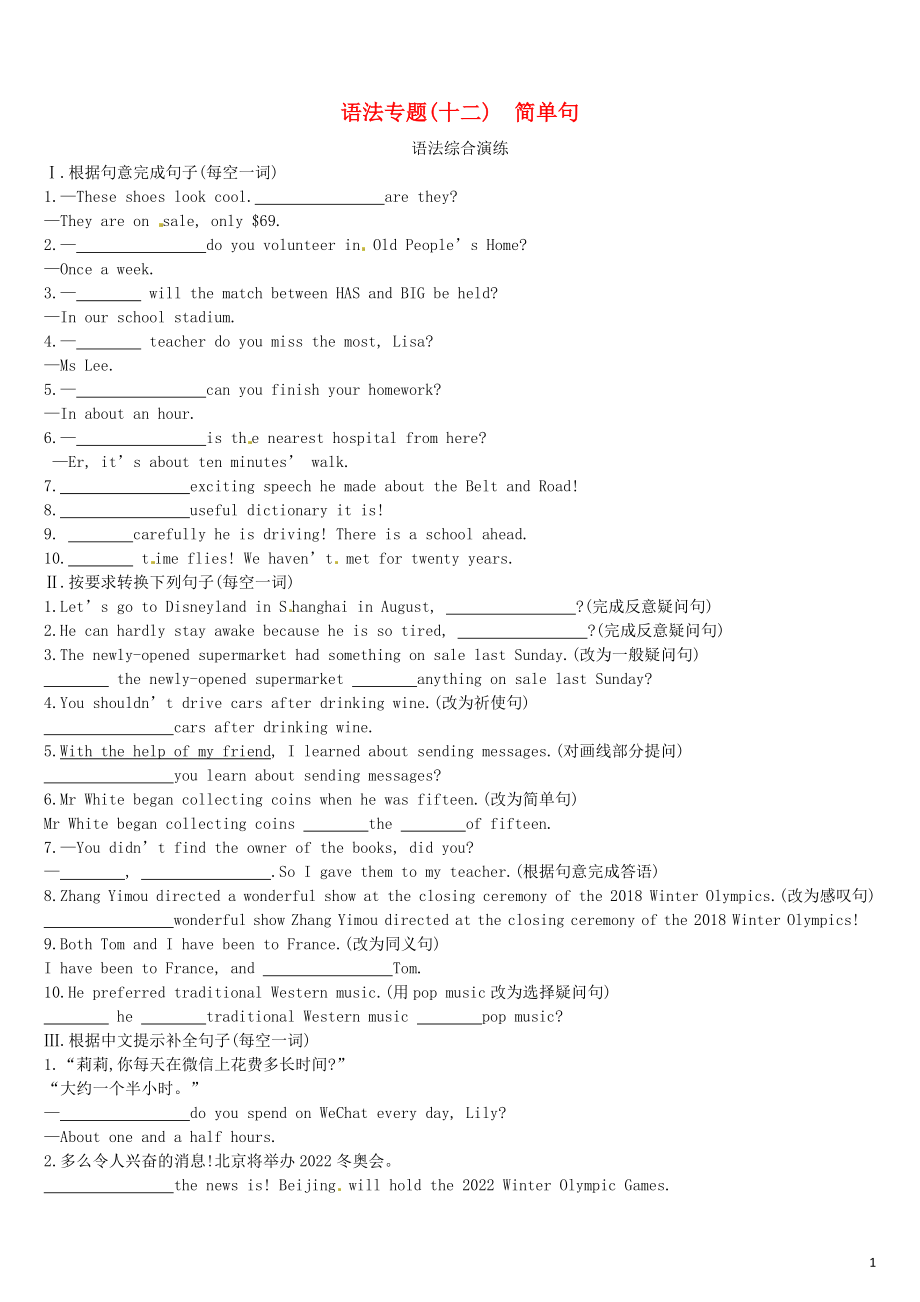《(鄂爾多斯專版)2019中考英語(yǔ)高分復(fù)習(xí) 第二篇 語(yǔ)法突破篇 語(yǔ)法專題12 簡(jiǎn)單句習(xí)題》由會(huì)員分享��,可在線閱讀�����,更多相關(guān)《(鄂爾多斯專版)2019中考英語(yǔ)高分復(fù)習(xí) 第二篇 語(yǔ)法突破篇 語(yǔ)法專題12 簡(jiǎn)單句習(xí)題(3頁(yè)珍藏版)》請(qǐng)?jiān)谘b配圖網(wǎng)上搜索。
1����、語(yǔ)法專題(十二) 簡(jiǎn)單句
語(yǔ)法綜合演練
Ⅰ.根據(jù)句意完成句子(每空一詞)
1.—These shoes look cool. are they??
—They are on sale, only $69.
2.— do you volunteer in Old People’s Home??
—Once a week.
3.— will the match between HAS and BIG be held? ?
—In our school stadium.
4.— teacher do you miss the most,
2、Lisa??
—Ms Lee.
5.— can you finish your homework??
—In about an hour.
6.— is the nearest hospital from here??
—Er, it’s about ten minutes’ walk.
7. exciting speech he made about the Belt and Road!?
8. useful dictionary it is!?
9. carefully he is driving! Ther
3��、e is a school ahead.?
10. time flies! We haven’t met for twenty years.?
Ⅱ.按要求轉(zhuǎn)換下列句子(每空一詞)
1.Let’s go to Disneyland in Shanghai in August, ?(完成反意疑問句)?
2.He can hardly stay awake because he is so tired, ?(完成反意疑問句)?
3.The newly-opened supermarket had something on sale last Sund
4��、ay.(改為一般疑問句)
the newly-opened supermarket anything on sale last Sunday??
4.You shouldn’t drive cars after drinking wine.(改為祈使句)
cars after drinking wine.?
5.With the help of my friend, I learned about sending messages.(對(duì)畫線部分提問)?
you learn about sending messages??
6.Mr
5���、White began collecting coins when he was fifteen.(改為簡(jiǎn)單句)
Mr White began collecting coins the of fifteen.?
7.—You didn’t find the owner of the books, did you?
— , .So I gave them to my teacher.(根據(jù)句意完成答語(yǔ))?
8.Zhang Yimou directed a wonderful show at the closing ceremony of the 20
6���、18 Winter Olympics.(改為感嘆句)
wonderful show Zhang Yimou directed at the closing ceremony of the 2018 Winter Olympics!?
9.Both Tom and I have been to France.(改為同義句)
I have been to France, and Tom.?
10.He preferred traditional Western music.(用pop music改為選擇疑問句)
he traditiona
7、l Western music pop music??
Ⅲ.根據(jù)中文提示補(bǔ)全句子(每空一詞)
1.“莉莉,你每天在微信上花費(fèi)多長(zhǎng)時(shí)間?”
“大約一個(gè)半小時(shí)���?���!?
— do you spend on WeChat every day, Lily??
—About one and a half hours.
2.多么令人興奮的消息!北京將舉辦2022冬奧會(huì)�。
the news is! Beijing will hold the 2022 Winter Olympic Games.?
3.努力工作,中國(guó)夢(mèng)就會(huì)實(shí)現(xiàn)。
, o
8����、ur Chinese Dream will come true.?
4.在我們學(xué)校對(duì)面,有一家書店����。
our school a bookstore.?
5.我從未去過法國(guó),湯姆也一樣����。
I have never been to France, Tom.?
Ⅳ.[2018·臨沂改編]選詞填空
閱讀下列短文, 用方框內(nèi)所給單詞的正確形式填空��。(每詞限用一次)
strong die into speak we success write come include why
He was a poet(詩(shī)人)
9��、 known for the nostalgia(懷舊) he describes in his poems.Now, it’s time for us to express 1. nostalgia for this great writer.?
On December 14, 2017, the famous Chinese poet Yu Guangzhong passed away in Taiwan.Yu and his family moved to Taiwan in the 1950s.He lived and worked there until his 2.
10����、 .?
Nostalgia(《鄉(xiāng)愁》) is Yu’s famous poem in which he expresses his homesickness(鄉(xiāng)愁) for the Chinese mainland when he was in Taiwan.The poem 3. out in 1971, and it remains highly popular among Chinese 4. worldwide.Even those who know little about literature enjoy lines from the poem.The poem
11、is 5. in Chinese high school textbooks.?
Besides his achievements in poems, Yu was also a 6. translator(翻譯家), essay writer and critic.He once translated English poet Siegfried Sassoon’s poem InMe, Past, Present, FutureMeet 7. Chinese.?
Yu spent his whole life 8. .In a 2015 interview
12��、 with People’sDaily, he said, “The reason 9. I keep writing till today is my passion(熱愛) for the Chinese language.”He then added that his love for his mother and his motherland made this passion even 10. .?
參考答案
Ⅰ.1.How much 2.How often 3.Where
4.Which 5.How soon 6.How far 7.What a
13�、n
8.What a 9.How 10.How
Ⅱ.1.shall we 2.can he 3.Did; have
4.Don’t drive 5.How did 6.at; age 7.No; I didn’t
8.What a 9.so has 10.Did; prefer; or
Ⅲ.1.How long 2.How exciting 3.Work hard; and
4.Opposite;is 5.neither/nor has
Ⅳ.1.our 2.death 3.came 4.speakers
5.included 6.successful 7.into 8.writing
9.why 10.stronger
3
 (鄂爾多斯專版)2019中考英語(yǔ)高分復(fù)習(xí) 第二篇 語(yǔ)法突破篇 語(yǔ)法專題12 簡(jiǎn)單句習(xí)題
(鄂爾多斯專版)2019中考英語(yǔ)高分復(fù)習(xí) 第二篇 語(yǔ)法突破篇 語(yǔ)法專題12 簡(jiǎn)單句習(xí)題

